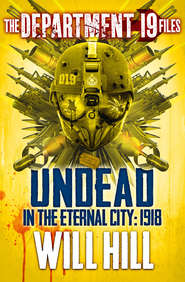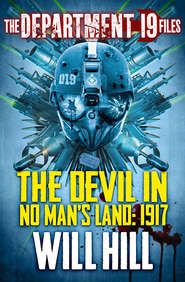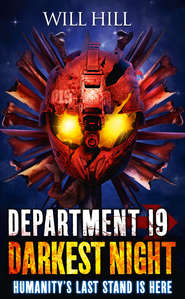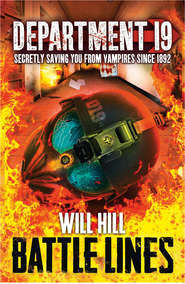По всем вопросам обращайтесь на: info@litportal.ru
(©) 2003-2024.
✖
Department 19
Автор
Год написания книги
2019
Настройки чтения
Размер шрифта
Высота строк
Поля
“What happened?”
“Sadly, Mr Norris died. He returned no better for his absence, complaining of fever and hunger, and then no more than two weeks after his return we received word from his brother that he had passed away. We have only just found a permanent replacement this past month.”
“Where did this Norris take his convalescence?”
“In Romania.”
The valet drew in breath. Van Helsing spoke in a voice full of menace. “Where did this conductor live?”
Stoker looked at him with open confusion.
“Sir, Harry Norris was a kind, gentle man of more than sixty years, and was with the Lyceum for at least twenty of them. He would not have hurt a fly, sir, I assure you. And even if I am wrong, the poor man is dead, and cannot possibly be involved with the disappearance that occupies us tonight.”
Van Helsing’s hand shot out from the folds of his cloak and gripped the night manager around his upper arm. Stoker cried out. “Where did he live?” the old man said.
“I don’t know!” the night manager pleaded. “Truly I don’t. He was always the last to leave the theatre, and he lived alone. Now, please, sir, release my arm, I beg you!”
Van Helsing let go of Stoker, who immediately grabbed his arm with his hand and looked at the old doctor with a look of pure terror.
“What is underneath this building?” Van Helsing asked.
“I do not know,” whispered the night manager, still clutching his arm.
“Perhaps it is time you found out. Take us to the orchestra pit, quickly now.”
“It’s this way,” Stoker said, his voice still low and full of fear and pain, and led them into the bowels of the theatre.
Their second journey through the backstage of the Lyceum was silent.
The night manager led them through corridors of dressing rooms, past a large door separate from the others upon which was written Mr H. Irving in elegant script, past doors marked MAKEUP, ATELIER, BRASS, WIND, PERCUSSION and PRIVATE, down a narrow staircase and finally through a door that opened into the rear of the orchestra pit. Van Helsing placed a hand on Stoker’s shoulder and entered the pit first, walking quickly through the neat arrangement of chairs and stands, up two shallow wooden steps to the entrance to the conductor’s box. He stayed on the top step, not entering. The valet and the night manager stood behind him on the floor of the pit.
In the box was a circular red rug that covered the floor, an ornate music stand holding the score for The Tempest, and nothing else. Van Helsing ordered Stoker and the valet to stand back. He reached in and gripped the edge of the red rug and then pulled it violently out of the box.
“Sir, I must protest!” cried Stoker. “This is most—”
“Come up here,” interrupted Van Helsing. “And see if your objection still holds.”
Stoker and the valet stepped up into the conductor’s box. In the middle of the floor was a heavy wooden trapdoor.
Van Helsing turned to the night manager and the valet.
“Be very, very careful from here on,” he said.
Chapter 7
IT’S HARD TO BREATHE WITH A HAND AROUND YOUR THROAT
The lighting in the dormitory switched to a purple ultraviolet as the alarm hammered into Jamie’s skull. Frankenstein pulled a radio from his belt and keyed in three numbers. He held the radio to one ear, placed a giant hand over the other, and listened.
“What’s going on?” Jamie yelled. Frankenstein held a hand out towards him and turned away, his ear hunched into his shoulder, trying to hear what was being said on the radio.
Jamie looked around. There was a door in the wall to his left, and he ran towards it, desperate to get away from the noise that was making his head swim and his stomach churn, desperate to get away from this place and find his mother. Frankenstein reached out and grabbed for him but Jamie saw it coming, slipped around the outstretched fingers, shoved the door open and ran through it.
He had just enough time to register that he was in a long grey corridor before something crashed into him and he sprawled across the smooth floor. His head cracked the ground hard, and he saw stars as a voice shouted at him, and he sat up.
“What the hell are you playing at?” A short, overweight man in a white doctor’s coat was standing over him with a look of extreme annoyance on his face. “Who are you? What are you doing here?”
“I’m Jamie Carpenter,” he shouted. “Can you tell me where I am? Please?”
“What did you say your name was?” the doctor yelled, his eyes wide.
Jamie repeated it.
“Christ. Oh Christ.” The doctor looked around, as if he hoped there would be someone to tell him what to do. “You’d better come with me,” he eventually yelled, extending a hand towards Jamie. “Seward’ll skin me alive if anything happens to you. Come on, on your feet.”
Jamie hauled himself upright.
“Where are we going?” he yelled.
“Arrivals,” the doctor yelled back. “Something’s inbound, so it’s the safest place for you to be.”
“Why?”
“Because it’s where the guns are.”
Jamie ran down endless corridors, his head ringing with the relentless wail of the alarm and the thumping strobe of the purple lights. The doctor was short and round but he ran with a grim determination, his jaw clenched, his eyes staring into the middle distance, and Jamie found himself sprinting just to keep up.
The doctor finally stopped running in front of a wide lift platform, little more than a steel frame striped black and yellow. Jamie stepped on to it, the doctor pushed a button set into one of the metal columns, machinery far above them ground into life, and the platform began to ascend. Its passengers doubled over, hands on their knees, trying to catch their breath.
Jamie pulled air into his lungs and stood up straight. As he did so, they passed a cavernous open floor, in the middle of which hulked a vast angular shape, purple track lighting on the walls and floor illuminating tantalising details: three huge sets of wheels, a dark triangular fuselage, and two wide wings that stretched almost to the walls. Jamie crouched down as they rose towards the ceiling, but the shape disappeared below him as the lift continued its ascent.
“What was that?” Jamie asked.
“Don’t you worry about that,” wheezed the scientist in reply. “You keep your eyes in this lift.”
Jamie looked at him, then shrugged and turned away.
Fat idiot. Don’t tell me where I can’t look.
Gears crunched above his head and the lift started to slow. They were rising through a dull grey shaft, which suddenly opened out into a wide room, full of movement and noise.
One whole side of the vast semi-circular room was open on to a wide tarmac area that led out to the middle of the long, brightly lit runway. Inside, two lines of black-clad figures, eight wide, were stood facing the huge open doors, submachine guns set against their shoulder, pointing out into the darkness. A chill ran up Jamie’s spine when he saw them.
I’ve seen people like this before. They look like soldiers, they look like the men who—
He couldn’t let himself finish the thought. He looked away from the dark figures, and saw the round crest he had seen in the white corridor, stencilled high on the huge hangar wall. The same three Latin words were stamped below it, running almost the entire length of the vast surface.
Lux E Tenebris











